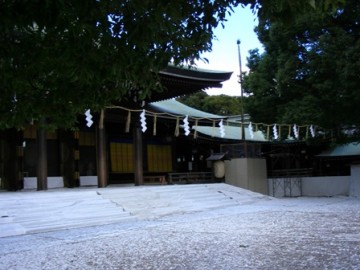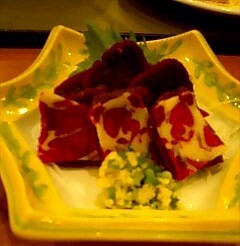13 February 2008
Dear Australians: Apology to the Aboriginal people
The Austraian government made an official apology to the Aboriginal people. The Prime Minister said "sorry" to the Stolen generation who were taken away from their families to concentration camps to be assimilated to white values.
I've seen the movie "Rabbit Proof Fence." Three Aboriginal girls forced to live in the camp apart from their parents escaped from the camp to go back their home by tracking down the rabbit proof fence. That was based on a true story. What a terrible thing whites did to them. This Aborigines' sad history was mentioned in the You Tube Video about whaling issue. Some scenes of the video showed Aborinial people and subtitles "Australians treated Aborigines inhumanely." The video was viewed by the Australia's foreign minister. It is now removed. But it was very interesting. The theme was Australians' anti-whaling is racist sentiment against Japanese.
Now we feel like Aborigines who were taken away their identity and culture. What is wrong with hunting whales and eating the meat? You are not only protesting whaling because of the extinction issue. You think whales are special animal that even there were plenty of it in the ocean, anyone should not hunt even one of them.
Your government showed the photos of captured whales being transported to the fleet from the ocean by the anchor. Cruel? Haven't you ever seen the photos of the meat factories? See this video.
Are you extracting meat from cows, pigs and kangaroos without killing them? Are you living in the Disney fantazy? Learn the history of your people, there were Australian whaler ships in the past.
I shall stop eating Australian beef because cows are cute and intelligent. That is how you think.
I do not think your country is civilized nation. You might poison the beef like what Chinese did to us.
It is just fair to decide not to eat the meat imported from the people who criticize what we eat.
The photo of whalemeat sashimi served in a restaurant in Tokyo.
09 January 2008
Dear Australians: Japan's Whaling Issue
Maybe not only for Australians, but for Canadians, Americans, Britons and other Caucasion dominated countries except Norweigians and Icelandish.
I've just heard the news this You Tube site attracted enormous attention from Japanese and Australians.
Australian patrol ships were dispatched to watch Japan's whaling in the Antarctic sea.
The video featured how racist Australia's anti-whaling policy is. Kind of radical and provocative.
The scenes of Australians killing Dingos and kangaroos are included.
I don't know which part of it is true and not.
People here in Japan are so concerned that western nations' anti-whaling movement comes from the notion that whales are cute animals rather than endangerness of the whales. Not environmental, more of political and cultural.
Anti-whaling activisits should insist that their act is solely based on endangerness of the species. They seem very emotional, and forcing their own values on others. I hate Green Peace in that sense.
When I was in U.S., some criticized Japan's whaling but none of them say eating whalemeat is barbaric. I remember one American driving instructor said "I want to try if I can." I ate some whale meat when I was small. It was not so delicious but I don't care if others like to eat. You can eat anything you want except humans on the earth.
We eat beef, pork, lambs and so on. They are all cute. Since we conqure the earth, we've got the rights to eat them.
But in one point other than the endangerness issue, I think Japan should refrain from hunting whales in Antarctic Sea. That is sending fishery boats to far, far to the south harms environment because it wastes so much fuel gas. Japanese traditional whale hunting has been done on the coasting areas of the islands.
This Japanese article has the photo of dismantling of the whales hunted from the coastal sea area. The whale is not what is classified as "endangered species" by IWC. We have the right to hunt minke whales, which IWC classified as "endangered" within our territorital seas. Inuits in Alaska, hunt endangered whale species and it is permitted by US government and IWC. But I think that is OK to do. It is their native culture and what they do is within their territorial sea.
20:55 Posted in Australia, Culture, Politics | Permalink | Comments (0) | Tags: environmentalism, Racism, Whaling
02 January 2008
New Year's Day in Japan
HAPPY NEW YEAR! 2008
On the first day of this new year, I visited the city's most famous shrine, Meiji Jingu. It is located in the center of Tokyo in a huge forest park. I had to wait for an hour to get to the altar. In the New Year's Week, they set up special big altar for the huge visitors. When you reach the altar, you throw a coin to make a wish for the new year. The altar becomes like Trevi Fountain in Rome. The sea of coins on the white matt. See the below photo.
There was a huge crowds and so many shops in the shrine. It was almost a big festival going on but if you go out of the shrine and walk on the shopping streets. You can find quiet streets with shattered shops. Usually, Japanese New Year Days are quiet time and holidays for the family gathering like Thanks Giving Holidays in the U.S.
You can see what it is like on New Year's Day in Tokyo on this You Tube site.
The footage shows from the entrance of the shrine to the quite shopping streets. In between it has scenes of waiting crowds forced to view the commercial of Kleenex on the big monitor screen, people walking towards the altar, throwing coins.

13:40 Posted in Culture | Permalink | Comments (0) | Tags: Tokyo, Japan
23 May 2006
What is "The Crysanthemum and the sword?"
| A Classic Analysis of the Japanese People - The Crysanthemum and the Sword | |
| | |
| The Crysanthemum and the Sword is a comparative analysis written by cultural anthropologist Ruth Benedict during the Second World War. |
21:25 Posted in Books, Culture | Permalink | Comments (0) | Tags: Japanese






